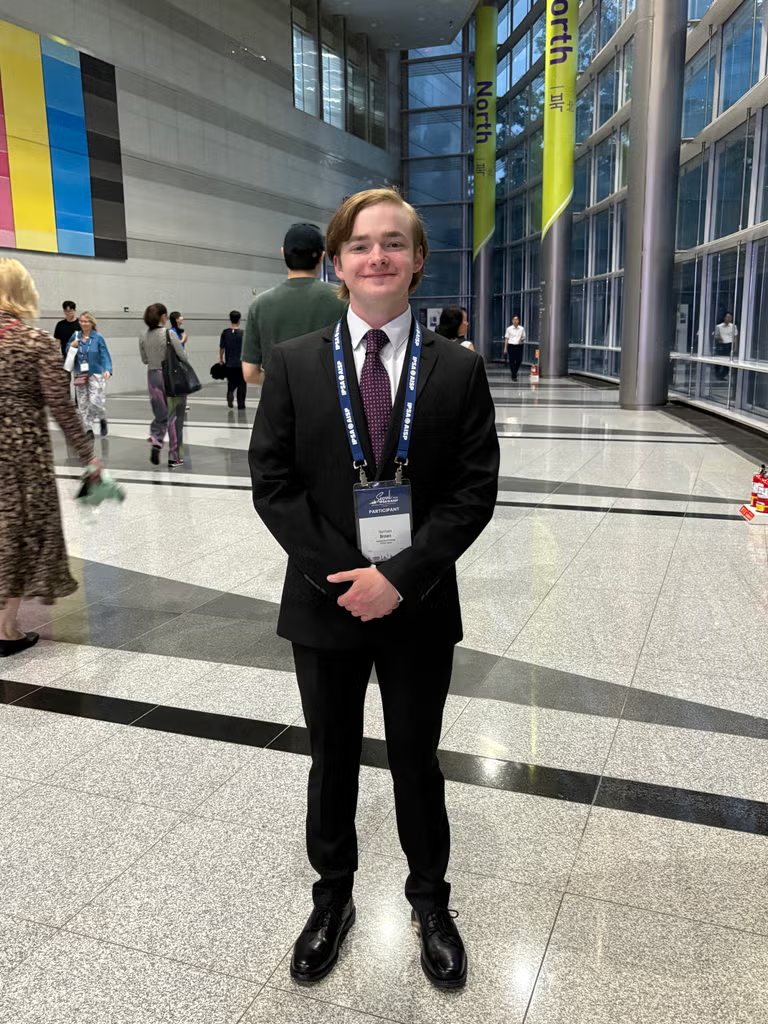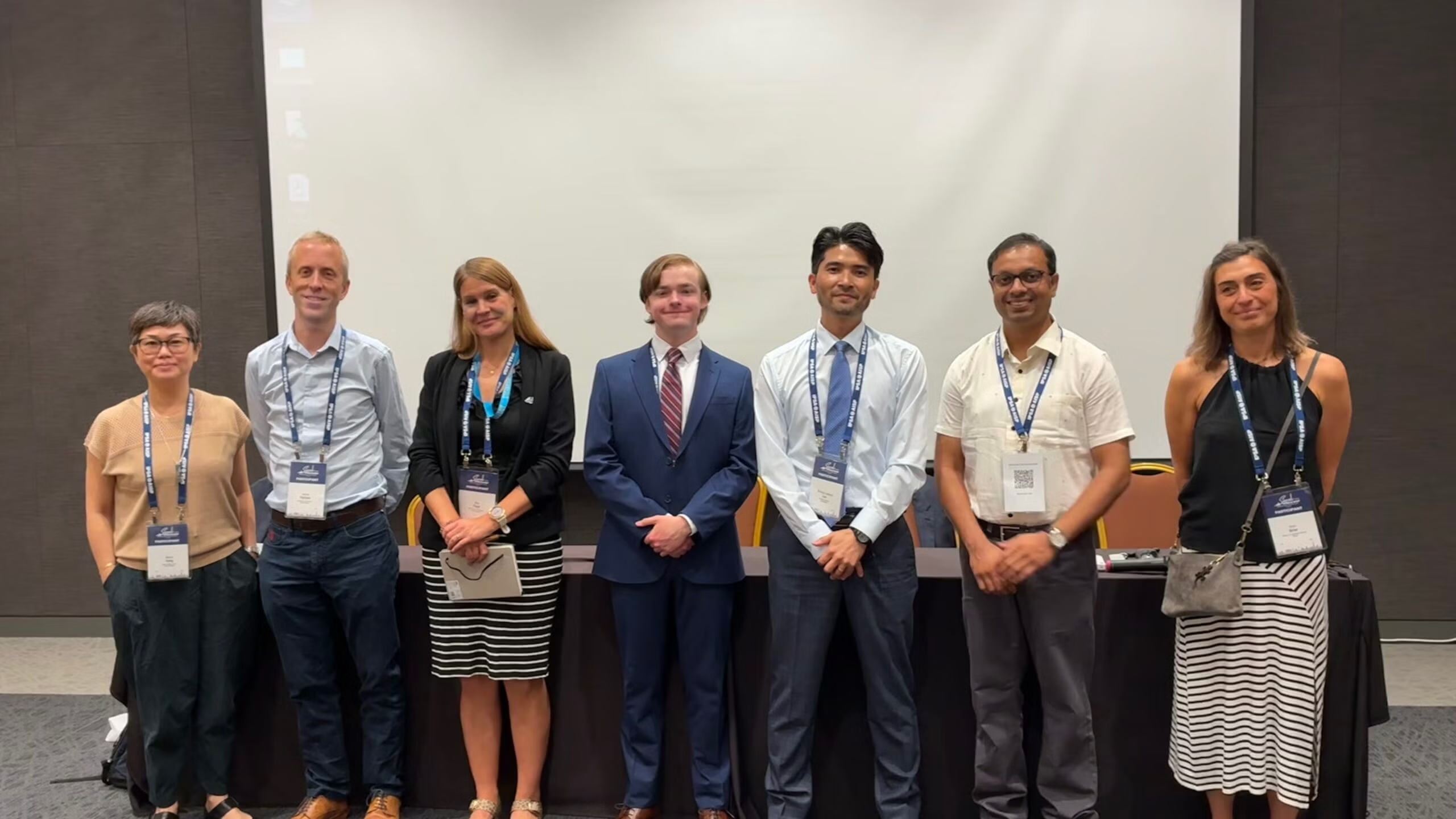At SFS, undergraduate students engage in transformative academic and international experiences that extend well beyond the classroom. In July, Harrison Brown (SFS’27), an international politics major, presented an original research paper at the 2025 International Political Science Association Conference in Seoul, South Korea. We talked to him about the focus of his research, what it was like to share his work on a global stage and advice for other undergraduate students hoping to do the same.
Q. What inspired you to pursue this research topic, and how did you develop your project? Did you work with a faculty member on the project?
A. I actually started this project right before and during my senior year of high school. I applied to a program with the Cambridge Center for International Research where I was paired up with a professor in a field I was interested in. I was very interested in international relations, especially in security and defense policy. The NATO-Russia dynamic had been a particular area of interest for me for a while, and the war in Ukraine was a reminder of how relevant this issue was.
I was paired up with Dr. Harald Wydra at Cambridge, and we spent months discussing and reading political theory and the history of NATO-Russia relations. After this, I began writing a research paper based off of these discussions. The project was founded on examining very large-scale issues; namely, why had NATO-Russia relations evolved the way they had since the end of the Cold War? This question was addressed both in terms of the ideological motivations of each side and the specific actions each side had taken.
Q. Can you walk us through your main research findings and why they’re important?
A. My paper is a defense of International Liberalism and the International Liberal Order—the collection of nations that cooperate closely based on the principles of international law, human rights and democratic values. The order and ideology itself is examined as well as NATO specifically; the latter serves as a case study of International Liberalism. I argue that the values-based cooperation of the order and of NATO serve to promote stability and peace and ultimately are a force for good.
I also address counterarguments against both International Liberalism as a whole and NATO specifically, asserting that claims of NATO aggression are unwarranted and that despite its flaws, the International Liberal Order is a net positive. This is a very important point to consider given the current state of the world, as values-based cooperation and the organizations founded on this principle are being challenged as we speak. The question of what kind of values decide the world order—or indeed, if values even have a role or if there will be a world order at all—is not a hypothetical anymore. There are forces competing to decide the answer right now.
Q. What was it like presenting your work at the 2025 International Political Science Association Conference in Seoul? Were there any moments that stood out?

A. It was a little surreal presenting my paper at the conference! I had never attended a conference before and certainly never presented a research paper, so I was naturally a bit nervous. When I went up to present, though, I actually found myself enjoying it. It felt exciting to be able to get in front of a group of people and put forward my work. In addition to the actual presentation, I was able to attend a number of other panels over the next few days. This was also incredibly exciting, as I was able to listen in on so many different interesting presenters discuss their research and then ask them questions and talk with them after.
Q. How has this research experience shaped your perspective on your international economics studies or future career path?
A. My courses in the SFS helped provide even more context and background for what I was researching and writing about. They helped me understand in greater detail some of the concepts I wrote about—not just in the context of NATO-Russia but more broadly, which actually helped when thinking about potential broader ideological arguments against my paper. I also think that my time in the SFS in general helped prepare me for the conference. I have had the opportunity to hear from many academic and professional experts from the worlds of IR and defense (and have taken classes taught by them), and I think being exposed to that level of expertise helped remove a lot of the mystery surrounding it. Interacting with individuals at that level, while still a bit intimidating, felt a lot less impossible than it did before.
The conference also helped to fully introduce me to the world of academic research. It was fascinating being able to hear from so many different professors and researchers, and it helped me to appreciate the wide range of views and work being done. To be able to listen to such a varied collection of research topics and so many international perspectives was unlike anything else I have experienced.
Q. What advice would you give other students who are interested in presenting their research on a global stage?
A. This experience has made me appreciate how something so intimidating, while still requiring preparation and hard work, wasn’t as daunting as it had originally seemed. This is what I would tell anyone interested in doing something similar: don’t let any concerns or doubts hold you back—no matter your age or official level of experience. If you have a topic or concept you are interested in and you put in the work, you can get involved in the serious academic world and add your voice to the conversation.
